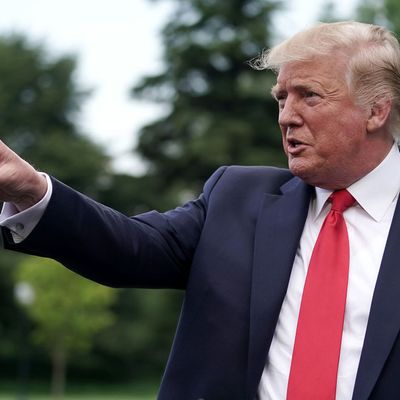
The past four weeks have been calm, as far as the Trump administration’s escalation of conflicts with foreign powers go. Since President Trump approved, then promptly canceled, a strike on Iran on the evening of June 20 — military aircraft were in the air when Trump nixed the bombing, claiming it would have killed 150 people — it seemed the White House had forgotten about its simmering tensions in the Gulf as it dealt with other crises.
Alas, the break may be over. On Thursday, just hours after an Iranian diplomat proposed a possible way to de-escalate the conflict, a Pentagon spokesman announced that a Navy vessel shot down a small Iranian drone that had come within 1,000 yards of an American amphibious-assault ship in the Strait of Hormuz, a bottleneck off the coast of Iran through which 20 percent of the world’s oil is shipped. Trump said the drone’s encroachment was “the latest of many provocative and hostile actions by Iran against vessels operating in international waters. The United States reserves the right to defend our personnel, our facilities and interest and calls upon all nations to condemn Iran’s attempts to disrupt freedom of navigation and global commerce.”
However, Iran is denying that one of its drones was taken down. Per The Guardian:
The deputy foreign minister, Abbas Araqchi, tweeted: “We have not lost any drone in the Strait of Hormuz nor anywhere else. I am worried that USS Boxer has shot down their own UAS [unmanned aerial system] by mistake!”
The semi-official Tasnim news agency quoted military spokesman General Abolfazl Shekari as saying on Friday that “all Iranian drones that are in the Persian Gulf and the Strait of Hormuz […] have returned to their bases.”
Iran’s foreign minister, Mohammad Javad Zarif, also denied Trump’s claim, saying “we have no information about losing a drone.” He then downplayed a report from Iranian news media of the Revolutionary Guard detaining a small oil tanker that Tehran claims was smuggling fuel.
At the U.N. headquarters in Manhattan earlier on Thursday, Zarif discussed how the two nations could ease tensions, while insisting that Tehran would not back down from its missile program if the U.S. supplied its enemies in the Gulf with similar weapons. As the New York Times explains:
Mr. Zarif initially appeared determined to calm tensions with the United States. For the first time, he floated an opening bid of modest steps that Tehran would be willing to take as part of new talks between the two adversaries.
The proposal would accelerate what the nuclear accord envisions as a “transition day,” now scheduled for 2023. That is when Iran formally ratifies an agreement with the International Atomic Energy Agency to allow far more intrusive inspections of the country, including sites that Tehran has never declared as nuclear-related.
In return, under the agreement, Congress would have to act to lift virtually all American sanctions on Iran.
Despite the pressure from Secretary of State Mike Pompeo and national security adviser John Bolton, Trump, in private, does not want an open conflict with Iran. “These people want to push us into a war, and it’s so disgusting,” Trump reportedly told a confidante in June, referring to his national-security team. But sometimes he has a funny way of showing it.
This post was updated after Iranian officials denied losing a drone.






























